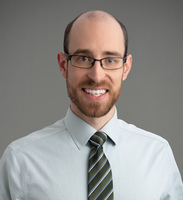New faculty Q&A with Tim Schmidt, MD
Tim Schmidt, MD
Assistant Professor
Division of Hematology, Medical Oncology and Palliative Care
What is your primary professional focus in any or all of our mission areas (clinical, research, and/or medical education)?
I am an early career clinical investigator focusing on the management of patients with multiple myeloma and other plasma cell disorders, including the use of autologous stem cell transplantation and novel cellular therapy approaches including CAR-T cells. My research focus is on developing and conducting early phase clinical trials using investigational drugs, as well as translational work and outcomes research that investigates patterns of disease biology, genomics, and drug sensitivity testing to explore whether treatment may be tailored to patients based on these characteristics. I am also very interested in medical education including teaching and mentorship of medical trainees, as well as continuing education conferences and patient outreach programs to inform the broader public about developments in myeloma.
What drew you to UW-Madison and the Department of Medicine?
During the recruitment process, I was immediately struck by the enthusiasm and kindness that I encountered among the hematology/oncology faculty at UW. It became clear to me that this was a place where junior faculty were having early career success, had institutional support to pursue their academic and clinical interest, and were genuinely happy. On an individual level, I found that my career aspirations fit nicely with the goals and needs of my division, and I had already identified mentors here at UW who were enthusiastic about my career development and opportunity for growth.
What are you most excited about during your first year with the department in this role?
I am most excited about developing into a regional expert within my disease specialty and networking with the outstanding community physicians and patient groups in Wisconsin and Northern Illinois. I am also excited to step into a position where my research goals can develop quickly and to join cooperative oncology groups where I can be an active collaborator on exciting, high-impact research.
What do you enjoy doing when you’re not working?
I love to be active and to spend time outdoors, and Madison is an amazing place to be for that. I have enjoyed running on Madison’s many bike and running trails, and can’t wait to visit the many Wisconsin state parks to go hiking and explore the beautiful nature around us. I also enjoy cooking and dabbling in home brewing.
Favorite piece of advice from a mentor or inspiring figure in your life?
I don’t think that this will apply to everyone, but as a heme/onc fellow I was advised by my mentor, who is not a basic scientist, to spend time in a basic/translational science laboratory. Although I don’t have aspirations of being a bench-to-bedside physician-scientist, had no lab experience going into it, and had my doubts at the start, I cannot overstate how important it was for me to get that experience. I don’t expect for my name to be on any high-impact publications from my time in the lab, but I was able to do this without adding time onto my training and it was invaluable to my development as an academic hematologist. As a result of working in the lab, I have a much better understanding of how scientific discovery happens and what is needed to help new clinical developments get to the clinic. Additionally, being able to talk about that experience was a key factor that made me stand out on the interview trail, both here at UW and at other academic centers. I strongly encourage any trainee who is interested in academic medicine to consider similar opportunities if available.